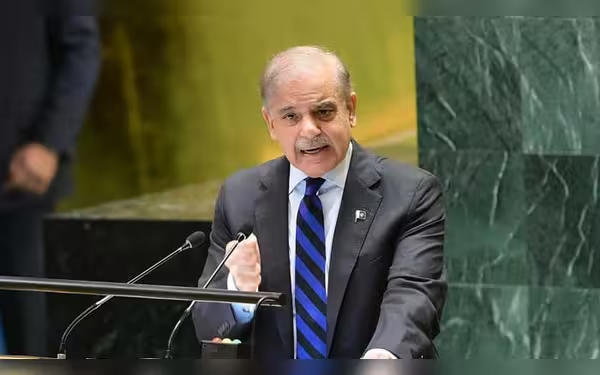Saturday, November 16, 2024 05:49 PM
PM Shehbaz Sharif Advocates for Kashmir and Palestine at UN
- PM Shehbaz Sharif highlights Kashmir and Palestine issues.
- Significant international support for Palestinian rights.
- Pakistan's economic recovery shows positive indicators.
 Image Credits: gnnhd
Image Credits: gnnhdPM Shehbaz Sharif passionately advocates for Kashmir and Palestine at the UN, highlighting human rights issues and Pakistan's economic recovery.
In recent times, the plight of the Kashmiris and Palestinians has garnered significant attention on international platforms, particularly at the United Nations General Assembly. For decades, these communities have faced severe oppression and brutality, primarily from India and Israel. The silence of the United Nations regarding these atrocities has been deafening, leading many to call for a more proactive stance from the Muslim Ummah. However, internal challenges within many Muslim countries have hindered their ability to take substantial action.
During the recent UN General Assembly, several countries, including Turkey, Jordan, Qatar, and Iran, raised their voices in support of Palestine, which prompted a fierce reaction from India and Israel. Among these voices, the stance of Pakistan, articulated by Prime Minister Shehbaz Sharif, stood out as particularly impactful. Critics have acknowledged that his remarks regarding the suffering of Palestinians and Kashmiris were both reasonable and heartfelt.
Prime Minister Shehbaz Sharif's emotional appeal highlighted the atrocities faced by Palestinians, especially women and children, and condemned the ongoing Israeli bombings. He urged the international community to intervene and work towards a peaceful resolution through a two-state solution. Similarly, he brought attention to the long-standing issues faced by the Kashmiri people, emphasizing the need for a resolution that aligns with their wishes and the Security Council's resolutions.
In his address, Shehbaz Sharif detailed the struggles and sacrifices of Kashmiris in their quest for freedom and self-determination. He painted a vivid picture of the overwhelming military presence in Jammu and Kashmir, where approximately 0.9 million Indian soldiers are stationed, often involved in violent acts against the local population. Furthermore, he condemned India's actions aimed at altering the demographic composition of Kashmir, which threatens the rights of the Kashmiri Muslims.
Following his speech, a protest walkout was staged by the Pakistani delegation and representatives from other Muslim nations in response to the Israeli Prime Minister's address. According to data from the Center for Public Opinion Research, Shehbaz Sharif's speech was the most viewed on the official United Nations YouTube channel, with 137,000 views, and it garnered 1.6 million views on Al Jazeera's TikTok account. Despite some political opponents questioning these figures, it is essential to recognize the significance of these views in highlighting the issues faced by oppressed communities.
Beyond his advocacy for Kashmir and Palestine, Prime Minister Shehbaz Sharif has also made strides in improving Pakistan's economic situation. While political disagreements may exist, it is crucial to acknowledge his efforts in steering the country away from the brink of bankruptcy. The coalition government he leads has faced criticism but has also made difficult decisions to stabilize the economy.
Recent economic indicators show a positive trend, with inflation rates dropping from 38% to 6.9%, interest rates decreasing from 22% to 17%, and a notable increase in remittances and foreign investment. The approval of a $7 billion loan program by the International Monetary Fund (IMF) is also a promising development for Pakistan's economic future.
However, it is vital to remember that while these figures may reflect a correction in the economic direction, the common citizen is primarily concerned with the cost of living. The government’s primary responsibility is to ensure that daily necessities are affordable and that citizens are relieved from the burden of high taxes and utility bills. Only when these issues are addressed will the public feel the true impact of economic improvements.
While Prime Minister Shehbaz Sharif deserves commendation for his efforts in advocating for Kashmir and Palestine, as well as for his role in stabilizing Pakistan's economy, it is essential for the government to continue focusing on the needs of its citizens. The path to a prosperous future lies in addressing the immediate concerns of the people, ensuring that they feel the benefits of economic recovery in their daily lives.













